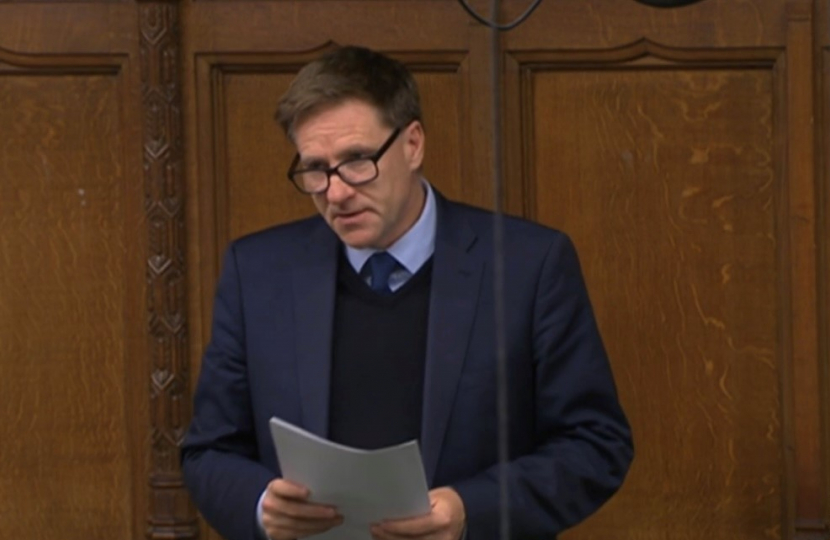Steve Brine, who Chairs the Health and Social Care Committee, led an important debate on the future of the introduction of a national licencing scheme for non-surgical cosmetic procedures.
The MP for Winchester and Chandler’s Ford welcomed the powers set out in Section 180 of the Health and Care Act 2022 which gave the Secretary of State powers to introduce a licencing scheme regime in England and posed the question, ‘what the Government is doing to speed up the implementation of the national licencing scheme’ following the announcement that Wales is set to be the first UK nation to do so. He was pleased that the Government were taking this seriously when the consultation process opened in England at the beginning of September.
Steve highlighted that non-surgical cosmetic procedures, such as Botox, dermal fillers, chemical peels and aesthetic procedures such as tattooing, body piercing amongst others are soaring in popularity and that more must be done to protect both those who undergo these procedures but also those who provide them.
Steve raised concerns that there is no set training for beauty therapists and other non-professionals who carry out these procedures. An issue that many respected practitioners, who are often medically trained and insured as part of their regulatory bodies, have campaigned about.
It is apparent that as the sector has boomed, there has been a rise in people being physically and mentally scarred for treatments that have gone wrong from poorly performed treatments. He told MPs that the industry has been described as the ‘wild west’ raising concerns for all those within the industry and called for the public to be educated on the risks of aesthetics procedures.
Steve called the national licencing scheme an important step towards better outcomes for the industry and consumers to hopefully remove rogue practitioners from the industry.
A large focus of the debate was on the length of time it has taken for the Government to act on introducing this important regulatory legislation, following the Health and Social Care Committee’s inquiry in 2022 which recommended that the licencing of non-surgical procedures was made a priority and introduced by July 2023. He pointed out that the consultation process closed in England a month ago and that when implementing the mandatory licensing scheme, it must be made sure that the framework demands a higher standard of care and proficiency for all practitioners.
Steve explained that there were four key priorities that needed addressing encompassing premises being competent and safe, practitioners holding the correct insurance, official guidance on the training and qualification expectation of all practitioners and a system that effectively records incidents so all cases that go wrong can be tracked. A system that would dramatically improve safety standards and ensure the public are equipped to protect themselves.
Steve asked the Minister, ‘when will we expect to see further action on this hugely important piece of legislation’ and ‘outline the timeline for the licensing scheme being introduced and to outline exactly what procedures will fall under the licensing scheme?’
The Minister reiterated, ‘The Government is committed to improving patient safety in this area. The scheme intended to be introduced in England will be more extensive than the scheme being introduced in Wales and will be supporting people to make informed choices and experience safe care. The Government are looking to address three areas; suitably trained and qualified practitioners, appropriate indemnity cover and premises that are appropriate for standards of hygiene and cleanliness.’ The Minister went on to explain, ‘The Government will be working with a number of professional from all backgrounds across the industry so that they futureproof the legislation so that emerging techniques and treatments will be also be covered by the legislation so that there will be no need to revise it on a regular basis.’
The Minister stated, ‘there have been 12,000 responses to the consultation, which is a larger than normal amount and are working at speed through the responses, looking to respond early in the new year. The Government will then set out which procedures will be covered, the expected training for practitioners, types of premises and potential fees. The Government will also look at who will enforce the licensing scheme. The Government will then set out the framework, consult on this before the final implementation and ensure practitioners have time to develop premises and skills to practise safely.’
The Minister finished by saying that she understood the urgency but outlined how complex this area is and looks forward to working with Steve and the Health and Social Care Committee to implement the national licencing scheme for non-surgical cosmetic procedures.
More information
Read the full debate via Hansard
Health and Social Care Committee
National Hair and Beauty Federation


